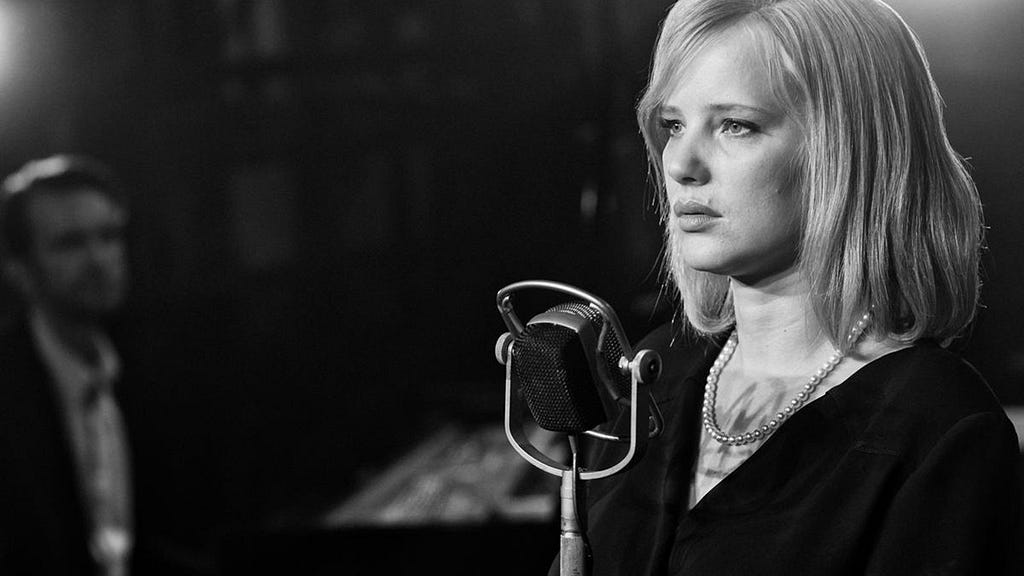As the first scene of Cold War by Paweł Pawlikowski fades in, Polish folk music fills the ears. As the descendant of Polish highlanders, I have heard these songs since birth. They’re something you can usually only truly experience in person; yet, as the melancholy men belt out their traditional tune, there seems to be no wall between the viewer and the performers. The cinematography, too, is stunning. The movie is in black-and-white, yet each frame is so well-defined it could stand alone in an art gallery. With each scene retaining visual freshness, Pawlikowski does justice to the awe-inspiring landscape of Poland.
Through this gloomy ambiance Pawlikowski tells a story of tumultuous romance. It begins with auditions for the newly formed Mazurek Ensemble, a touring highlander music ensemble, of which Wiktor (Tomasz Kot) serves as both director and composer. One woman, Zula (Joanna Kulig), stands out from the rest of the auditionees: she shares in the communal misery, yet has some unique drive. Wiktor is taken aback after she sings a Russian folk song and reveals a breathtaking voice: “She has something in her,” Wiktor says. “Energy. Temperament. This is something original.” It’s clear he isn’t just talking about her musical talent — he’s fascinated by her as a whole. So begins their love story.

There are several time jumps in the movie, sometimes of more than five-year periods, but rather than causing a disconnect, the shifting raises the stakes — between every endearing reconnection, every catastrophic fight, every uncontrollable tragedy, the viewer knows time is rapidly running out. From the most painful moments in the film — such as when Wiktor waits in vain on a street corner in Berlin for Zula to run away with him, or when he travels to Yugoslavia to see her but is dragged from the Mazurek performance and deported before they can even speak — an inevitable question arises: how many years will pass until they see each other again?
The viewer yearns for the interludes between the misery, the moments when Zula and Wiktor are together. Despite their constant flings with others, Zula’s oath at the beginning of the movie that she will be with Wiktor “always, everywhere, and until the end of the world” never comes under any doubt. No words are needed to show this: as they gaze into each others’ eyes across a crowded reception hall, the viewer can see their pure passion for each other taking control. Even as the disasters caused by the Cold War and by their interpersonal conflicts worsen exponentially as the movie progresses, they keep finding their way back to each other, and the tragically enchanting ending immortalizes this love.
Phenomenal acting and directing make such a captivating story possible. Both Kot and Kulig put on spectacular performances and have strong, genuine chemistry. The rest of the cast is just as brilliant, and even characters with no lines entirely sell each scene. Pawlikowski clearly thought through every aspect of this movie in extraordinary detail.
Though enchanting, this seems to be a world where no one smiles, no one stirs, no one chats. Sure, there are moments of dancing, laughter, and gaiety, but they are infrequent, and not all of these moments provide total reprieve from the sorrow that paralyzes every single character. But it so well depicts authoritarian Communism’s draining effects on a country that by all rights should be happy and full of life, sparing the movie from any expository dialogue to show that things are not as they should be.
By any standards, Cold War is virtually impeccable. It is one of those rare films that makes tears roll both because of artistic pureness and authentic sadness. Beautiful through and through, Cold War stays with the viewer long after the credits roll.
Cold War (2018) was originally published in The Yale Herald on Medium, where people are continuing the conversation by highlighting and responding to this story.
